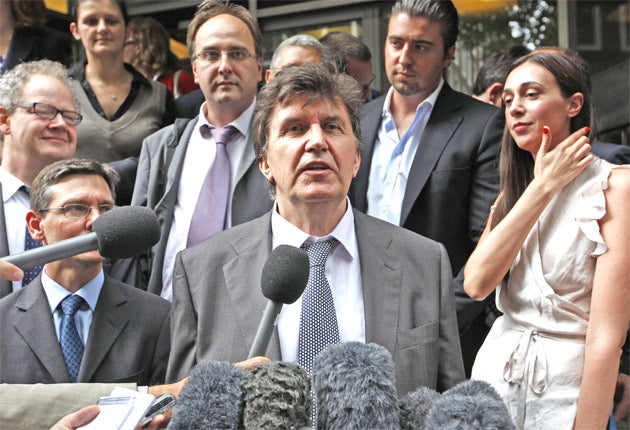Allowed to remain in Britain, the Bosnian accused of war crimes

A judge yesterday threw out an attempt by Serbia to extradite a former Bosnian president for war crimes after ruling that the request was "politically motivated" and an abuse of the British judicial process.
In an extraordinary finding that will embarrass Belgrade, Senior District Judge Timothy Workman ruled that the Serbian authorities tried to use a promise to halt the proceedings against Ejup Ganic in diplomatic horsetrading to persuade the Bosnian government to accept a disputed apology earlier this year for the massacre of 5,000 Bosnian men and boys in Srebrenica in 1995.
Dr Ganic, 64, an engineering professor who was appointed president of Bosnia Herzegovina for a chaotic 48-hour period in May 1992 that saw the outbreak of a brutal four-year war, was arrested at Heathrow airport in March this year on allegations of conspiracy to murder. A six-day extradition hearing earlier this month brought the events that presaged the bloody dissolution of the former Yugoslavia into Westminster Magistrates' Court as British lawyers acting on behalf of the Serbian government outlined claims that Dr Ganic was responsible for a series of atrocities in the Bosnian capital, Sarajevo.
But in a comprehensive rejection of the Serbian allegations, Mr Workman said there was strong evidence that Dr Ganic would not receive a fair trial in Belgrade and "these proceedings are brought and are being used for political purposes and as such amount to an abuse of the process of this court".
The university professor, who is a friend of Baroness Thatcher, was alleged to have "personally commanded" attacks on a Yugoslav federal army (JNA) officers' club, a hospital and a convoy of ambulances on 2 May 1992 before ordering the execution of wounded troops the following day.
The attacks, which happened while separatist Serbian forces began an assault on Sarajevo that developed into the infamous 44-month siege of the city, took place while the incumbent Bosnian president, Alija Izetbegovic, was being held hostage by JNA troops on the edge of the city. Mr Izetbegovic temporarily transferred power to Dr Ganic, who was based in an office block in central Sarajevo housing the Bosnian presidency.
Dr Ganic negotiated a UN-sponsored agreement to exchange Mr Izetbegovic for a Serb general surrounded by Bosnian forces in Sarajevo. But the deal fell apart at the last moment when a convoy of JNA vehicles carrying the general and between 250 and 400 soldiers attempted to retreat along the city's Dobrovoljacka Street and Bosnian militia opened fire.
The incident entered Serbian infamy with Belgrade claiming Dr Ganic and other Bosnian leaders had ordered the shooting of more than 40 JNA troops once Mr Izetbegovic was safe. Mr Workman found that seven soldiers had in fact been killed.
The London court heard that the so-called Sarajevo Column "massacre" has since been the subject of investigations by two international courts – the UN war crimes tribunal in The Hague and a separate Bosnian war crimes commission. Both bodies found that there was no evidence that Dr Ganic had known about or ordered the attack on Dobrovoljacka Street.
The court heard that following the arrest of Dr Ganic, who spent 10 days in a London prison before his £300,000 bail was posted by the millionaire Bosnian socialite Diana Jenkins, the Belgrade government had signalled to London and the Bosnian authorities it was ready to drop the extradition proceedings if Sarajevo signalled its acceptance of the Srebrenica Declaration.
The formal apology by Serbia for the massacre of Bosnian Muslims, which is seen as crucial to Belgrade's attempts to join the European Union, angered many victims by failing to describe the atrocity as "genocide".
Mr Workman said: "I am satisfied from the evidence... that during the course of these extradition proceedings attempts were made to use the proceedings as a lever to try to secure the Bosnian government's approval of the Srebrenica Declaration. That in itself must be capable of amounting to an abuse of the process of this court."
Dr Ganic said after his release that the case was a "textbook example of abuse". Flanked by his son and daughter, he said: "The government of Serbia tried to undermine the judiciary in this country, they used British taxpayers' money and they kept me here for five months. The conspiracy will be investigated. I acted honestly, with the law, defending my country."
Vladimir Vukcevic, of Serbian War Crimes Prosecutor's Office, said he was "not happy" with the ruling.
Join our commenting forum
Join thought-provoking conversations, follow other Independent readers and see their replies
Comments
Bookmark popover
Removed from bookmarks